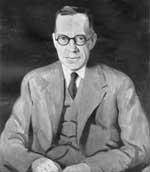|
|
||||||||||||||||||||||||
 |
Featured person
Recently added |
Derek Bell (1935 - 2002): |
||||||||||||||||||||||

|
| Derek Bell |
George Derek Fleetwood Bell was a precociously gifted musician who mastered a range of instruments, composed, and was internationally best known as the harpist of the Irish music group, The Chieftains, which he joined in the early 1970s, becoming a permanent member in 1974.
At the age of two, Bell was (wrongly) diagnosed as having progressive blindness, and his parents were advised to encourage the young Derek to concentrate on developing his sense of hearing as a sort of compensation, musical activities being recommended. By the age of 12, he had already composed complete works including a violin concerto which he sent to the BBC, suggesting they broadcast it (according to one friend of Bell's, he recommended that they engage Yehudi Menuhin as soloist). They declined, but invited him to perform on Children's Hour.
In 1951 he took up a scholarship at the Royal College of Music in London, where he studied oboe under the outstanding oboist Léon Goossens (NYTimes 15.2.1998). After graduating in 1957, he obtained a Bachelor of Music degree at the University of Dublin. Pursuit of further study took him across the Atlantic, all the time not adding strings to his bow - that is, learning new instruments. He studied piano under Rosina Lhévinne, wife of the great pianist Josef Lhévinne and herself a first class player in her own right (whose Julliard students included Van Cliburn, the legendary US winner of the Tchaikovsky Piano Competition at the height of the Cold War, and John Williams, the all-round musician known for his film scores, one of which scared a whole generation of shark-watchers). For a spell, he was the principal oboe, horn and piano player for the American Wind Symphony Orchestra (a select group mainly composed of full-time members of major symphony orchestras and based near Pittsburgh). He also appeared with the Royal Philharmonic Orchestra in London, and symphony orchestras in Pittsburgh, Moscow, Dublin, Liverpool, London and Budapest.
He began to play the harp on his re-settling in Belfast in the 1960s and becoming manager of the Studio Symphony Orchestra, he was responsible for tuning and maintaining the harps. After this it seemed only natural to learn to play them, hardly difficult for a talent like Bell's. He studied with Sheila Larchet-Cuthbert, a leading Irish harpist who had played in the Liverpool Philharmonic and the RTE Symphony Orchestras, borrowing his first harp from a local arts council. He mastered the harp quickly and in 1965 joined the BBC Northern Ireland Orchestra as a harpist and oboe player. His also taught the instrument at the Belfast School of Music. Another of the many instruments he could play was the cimbalom, a kind of hammered dulcimer. Bell had played on film soundtracks, and he played this instrument for some of the soundtrack of one of the great epic films of the 1960s, Doctor Zhivago, particularly famous for its soundtrack.
In 1972 he met The Chieftains for the first time on the occasion of a special St Patrick 's Day broadcast featuring the music of Carolan (as he is usually known - Turlough O'Carolan, the Irish harpist 1670-1738). Bell was then invited to play on the album, Chieftains 4, and in 1975 decided to join the group when they became professionals, time constraints edging him into leaving the BBC Northern Ireland Orchestra. Usually appearing on stage with them dressed in jacket and tie (prompting his fellow-members to nickname him "the professor"), whereas more de rigeur attire among the group was rather less formal, his harp playing augmented their sound palette. His demeanour, though, was informal enough that when the group were introduced to the Pope, Bell shook his hand and told him that he thought he was doing a fine job.
He was active with the Chieftains for rest of his life. The group toured throughout the world, and their many recordings, includiong many "crossover" albums with musicians from Sting to James Galway, earned them six "grammy" awards. Bell though retained his own profile, both composing and recording - his works included three piano sonatas and two symphonies; he recorded eight solo albums which included two of music by Carolan as well as a number with traditional Irish music.
A further interest was in Hinduism. He was a friend of Swami Kriyananda, a noted Hindu yogi, some of whose work he set to music and recorded, with title "Mystic Harp". A strict vegetarian and cat-lover, he lived in County Down, though died suddenly following a minor operation in Arizona, where The Chieftains were touring. Bell was awarded the MBE in 2000; The Chieftains gave a number of concerts in his memory which were recorded and issued as a tribute to him.
| Born: | 21 October 1935 |
| Died: | 17 October 2002 |
| Richard Froggatt |
| Acknowledgements: Wesley McCann |
| Bibliography: Dictionary of Irish Biography; obituaries (Guardian, Independent, 19 October 2002); http://www.irishcultureandcustoms.com/AMusic/DerekBell.html |


Home | Our Policies | Plaques | Browse | Search | Sponsors | Links | Help | Contact
Privacy & Disclaimer | Cookie Policy | Site Map | Website Design By K-Point
© 2024 Ulster History Circle









